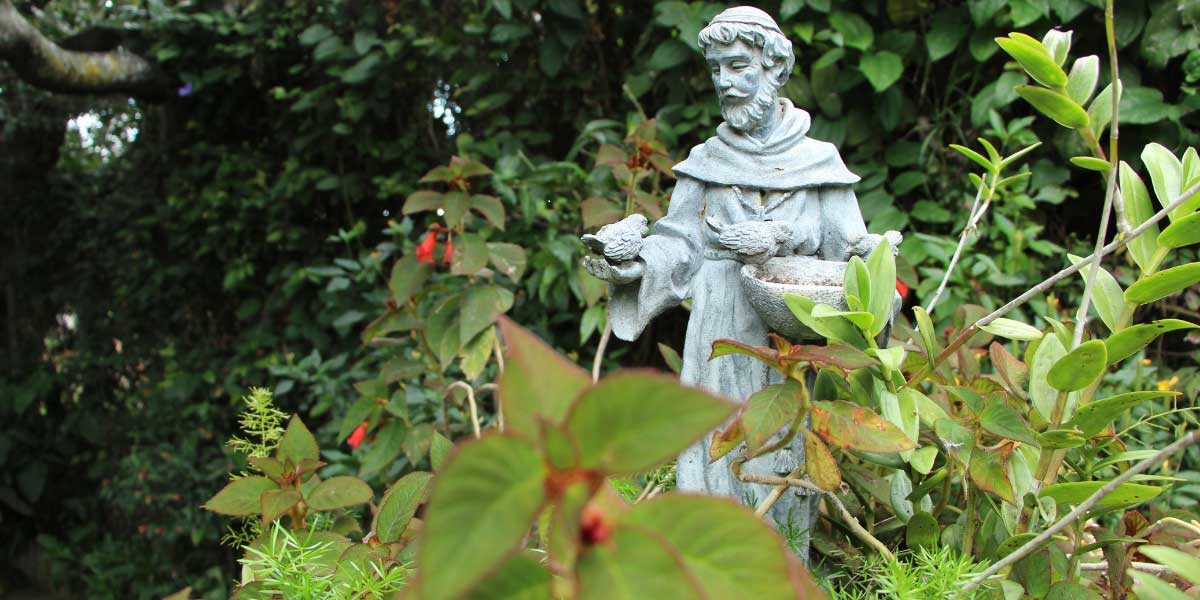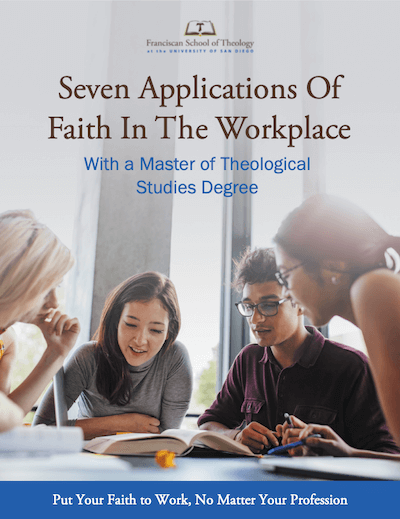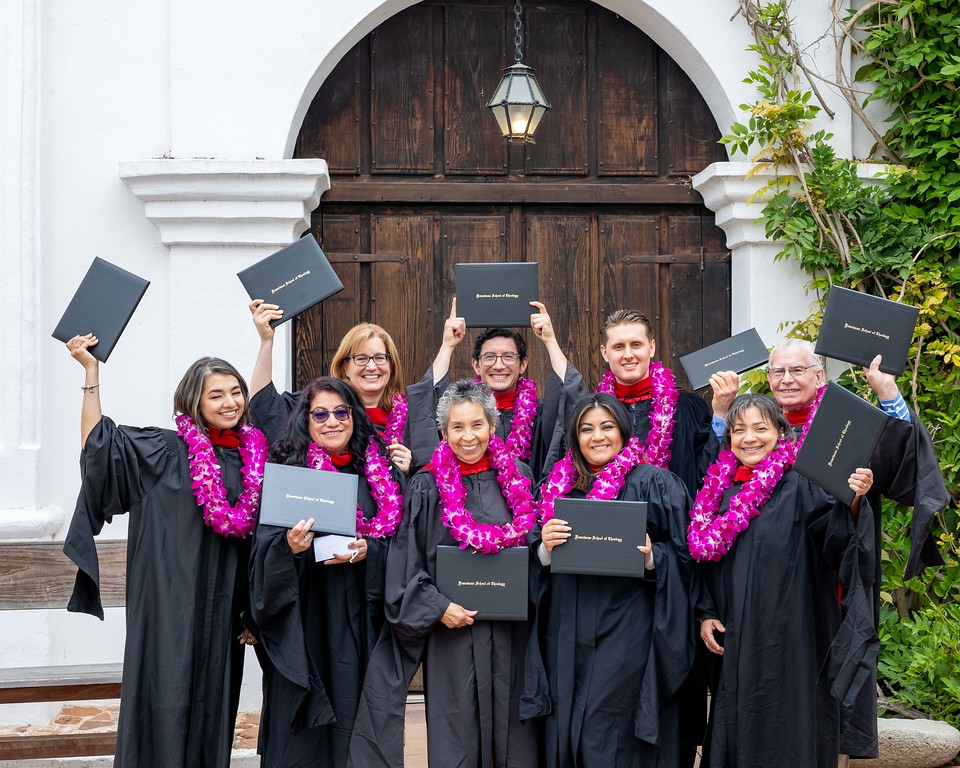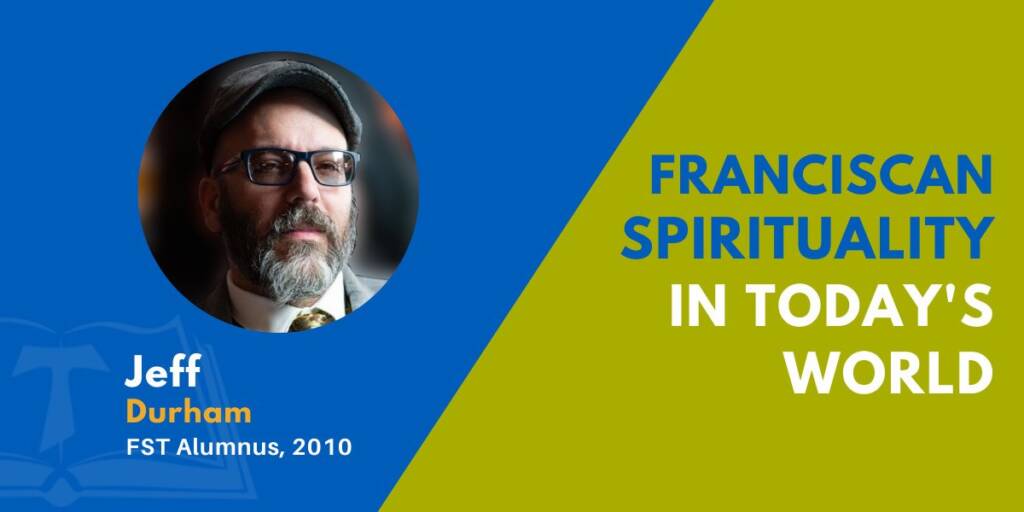The “Franciscan Way”
One of the most famous Catholic saints, universally loved and admired by people of all faiths, is Francis of Assisi. As Pope Francis reminds us, St. Francis of Assisi is “a saint of peace, a saint of the poor, a saint respectful of each person’s God-given uniqueness, and a saint with great love for all of God’s creatures.” When you hear the name St. Francis, what comes to mind? Perhaps you think of animals, a birdbath, or a garden statue of him you remember from childhood. Whatever the image, you have a sense of peace, tranquility, even humility. All these images offer glimpses into this tradition that we call “Franciscan.” Yet, there is even more: Franciscan spirituality cultivates a depth of meaning and openness to inner transformation based on the Christ-centered life that Francis embraced and modeled to others.
As a counter-cultural figure during his time, St. Francis constantly challenged dominant social norms, modeled social justice, and lived out his Christ-centered faith by being present to each person and creature he encountered. At the Franciscan School of Theology, we call this revolutionary way of living theology, “The Franciscan Difference”. This approach to faith and theology transforms one’s entire life, and affects how we show up in the workplace, the marketplace, and even the home. The Franciscan way of offering a peaceful presence is needed more urgently than ever today.
The Franciscan Difference – A Framework For Addressing Today’s Needs
In order to truly understand the depth of the Franciscan tradition, one must begin with a basic foundational understanding of this theology. How does one unpack centuries of theology and spirituality? As one of our professors, William Short OFM (Brother Bill), discusses in his literary piece A Franciscan Language for the 21st Century, “presented here are a few basic components of the Franciscan intellectual tradition…These basic premises of Franciscan thought, with much variation and development, can be considered recurring themes over the long arc of history, as our intellectual tradition has developed in varied cultures in vastly different times and places”. Short’s pillars include the following: “Human Person as Divine Image”, “All Creation in the Incarnate Word”, “Community Is Divine”, “Christ at the Heart of Reality”, and lastly, “Generosity, Poverty of God”. Through Short’s framework, we can better understand the bountifulness and relevance of the long-held tradition of Franciscan Theology. Even in today’s complex and ever-changing world Franciscan Theology remains more relevant than ever. Below is a deeper analysis and understanding of Short’s theological conceptual structure.
Human Person as Divine Image
According to Short, the concept of “Human Person as Divine Image” highlights “some of the reasons for St. Francis’ reverent treatment of every person he met.” For St. Francis, each individual was created in the image of God. Short proclaimed that “our humanity does not separate us from God, but connects us to God who chose to become human in Jesus because of generous love.” Such a profound belief in the value of others’ humanity has a lasting impact on how we view others and how we treat our neighbors, strangers, and individuals at large.
All Creation in the Incarnate Word
As Short continues, “Francis speaks of every creation, from heavenly bodies to earthly elements, as brother or sister to him… everything was made through the Word; all was created for the Word; all was created in the Word; and in Christ that Word took on flesh, that is, the creative divine Word took on the form of physical matter, embodied ‘Incarnate’.” This view of the universe, the attention we give to our surroundings, the attention and value we provide to our own care, and the attention we give to our environment are all intrinsically linked to the values held in the Franciscan tradition and the importance of our respect for the world. One can only imagine the lasting impact applying such values could have on our communities.
Community Is Divine
While some religions promote a view of God as a solitary monistic being, Short points out that the Franciscan tradition focuses on a Trinitarian God. As Short states, “Sharing a fundamental unity does not require the suppression of personal identity but enhances it. Diversity of persons is enriching; goodness is self-diffusive.” Considering God in this light is transformative as the focus shifts from individualistic to one “in relation with”. As Short explains, “far from exalting the isolated individual, a Trinitarian view of reality always looks to the individual-in-relationship, to the bonds of interdependence as images of the divine.” This paradigm has the potential to positively impact our society and our world as we know it.
Christ at the Heart of Reality
Franciscan Theology presents an alternative view on the “why” of Christ’s resurrection for humanity. While some theologies focus on Christ coming to save the world for our sins, per Short, the Franciscan view instead “emphasizes the love of God, enfleshed in Christ, as the center of reality.” Short points out that “Christ came into this physical world because the divine Trinitarian communion of persons wished to express divine Word, and that Word came to participate in the life of the universe as a created being… The Incarnation, the fact of Jesus, not the fact of sin, is at the heart of reality.” When considering the revolutionary nature of this theology, one can only imagine the possibilities for inner transformation that can emerge from this way of thinking, and more so from this way of believing. As Short puts it, “this ‘alternative evangelism’…portrays a God in solidarity with human suffering out of love, rather than a God who demands the sacrifice of victims. The focus is not on fighting sin but on giving life.” The Trinity, in this light, is seen as a loving Father, a supportive brother, rather than a just and merciless God.
Generosity, Poverty of God
According to Short, “From its inception, our tradition has not shied away from the world of business and commerce, but has tried to engage it in policy reform and promotion of ethical practices.” “Franciscan economics” focuses on the fact that everything is seen as a gift from God. As such, “poverty” consists of one’s unending giving. That giving is what serves as our thanks to God for our gifts and blessings, which in turn enriches one’s life. When we give generously to others, whether it be through work, our finances, our talents, our skills, or “just” by our very presence, we “act out who we really are: images of a generous God.” Franciscans have always stood apart from long-standing societal norms for the good of all. From the proposal of the idea of “just profit”, to the creation of credit unions, and more, even today, approaching ruling ideas with a lens of Franciscan theology could solve many of our most pressing issues.
Finding and Calling Upon St. Francis in Today’s World
As we contemplate the impact of St. Francis’ lived experience of faith and the theological tradition that grew around him hundreds of years ago, we can consider the many applications to today’s challenges and predicaments. Franciscan life is concerned with being present. It is focused not only on the heart and mind but also on showing up and being present: sometimes that showing up is through action. Sometimes that showing up is by bearing witness. Through the lessons that can be extracted from his life, St. Francis challenges each of us to be present: to be present to ourselves, to one another, and to all of creation. By being present to all around us, we are being present to the God who created us all from God’s abundant love. This might lead some of us to take action and to make a change. It would undoubtedly lead us to impact others and our communities in small and large ways. With so many issues, conflicts, crises in place, how does one even begin? Some of the answers can be found in the Franciscan principles. By reflecting on the pillars mentioned above, we can continue to address the following in transformative and meaningful ways and in areas such as:
-
- Caring for those in need within our community.
- Bringing compassionate action to our everyday lives, work, family, and community.
- Being present, respectful, and curious in all we encounter, even with those with who we disagree with.
- Being aware of global warming and how climate change will affect us, our brothers, and sisters.
- Learning about economic policies which impact our global landscape.
- Understanding international relations that are focused on the dignity of humans, equality, diversity.
- Appreciating a deeper understanding of human suffering rather than “a God who demands the sacrifice of victims.”
As Brother Bill puts it so beautifully, “We are heirs to an intellectual patrimony that spans with centuries, with a worldview that can offer fresh responses to questions posed in our society and Church today. We have resources to share and a responsibility to share them with those who are searching for ‘good news’ in our day.”
St. Francis may be the patron saint of animals and ecology. However, his devotion to God was clearly expressed through his radical love for all humanity and all of God’s creation. His example calls us to something more: to a greater awareness of interdependence, to a greater calling of being deeply present in each encounter we have, and to a life of deeper meaning. As Pope John Paul II stated in his Celebration of the World Day of Peace, “It is my hope that the inspiration of St. Francis will help us to keep ever alive a sense of fraternity with all those good and beautiful things in which the almighty God has created. And may he remind us of our serious obligation to respect and watch over them with care, in light of the greater and higher fraternity that exists with the human family.”
About This Piece
October 4th is when we celebrate the feast day of St. Francis of Assisi. St. Francis of Assisi serves as a beacon of Our Father, Christ, and The Holy Trinity. The following series of pieces are accounts of how this beacon called some individuals. Each story is different, each encounter unique. As we celebrate the feast day of St. Francis of Assisi, the following reflective pieces from Franciscan School of Theology alumni highlight the significant impact St. Francis has had and continues to have. Read more by clicking the links below.
STUDENT SPOTLIGHT
Piece 1 – St. Francis of Assisi and Franciscan Theology
Piece 2 – Finding and Relating to St. Francis – Derek John Thomas
Piece 3 – God’s Timing and The Franciscan Calling- Asher Marron
Piece 4 – Franciscan Spirituality in Today’s World – Jeff Durham
ABOUT THE PROGRAM
The online Master of Theological Studies – Franciscan Theology (MTS-FT) program is offered by the Franciscan School of Theology in partnership with the University of San Diego. This Fully online program is designed for working professionals and recent undergraduates alike; students of the online MTS-FT program study with renowned scholars whose teachings draw from lives of active service in parishes, schools, and community involvement. In addition, this unique online program uses faith studies to enact positive change in local and global communities. Learn more about the program here.




